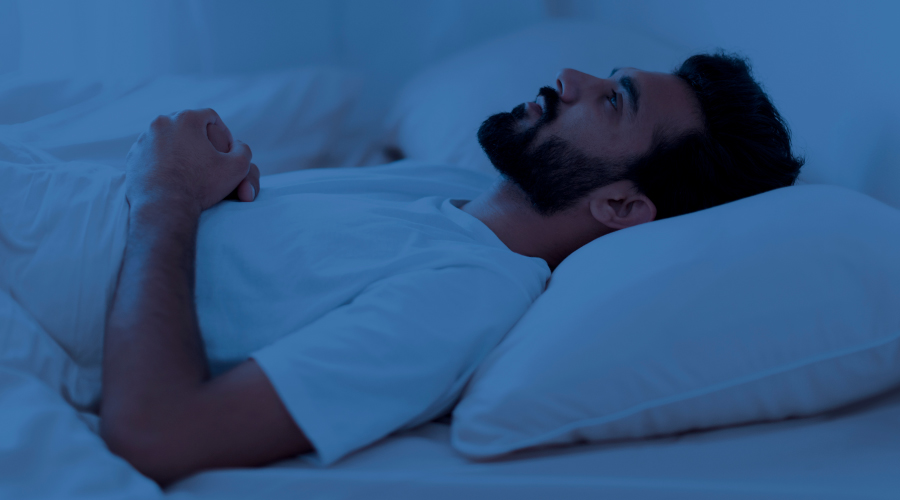

Losing sleep is no joke. If you have tossed and turned all night and laid awake wondering why, let’s find out. According to a survey conducted by RedMed, only 27% of people sleep well every night. The effect of sleeplessness can hinder how your body performs daily activities and may cause severe health conditions. Let’s learn about sleep deprivation definition, its signs, and how to prevent it in this article.
Sleep Deprivation Definition
The simple definition of sleep deprivation is not getting enough sleep. Adults need at least 7-8 hours of sleep every night to maintain best health. When people get less than the required time of sleep, it may further lead to other health conditions. Some sleep deprivation effects on the body are the inability to fight infections, brain fog, depression, and mood swings. Sleep deprivation can be short-term, resulting in loss of sleep for a couple of nights, or chronic, which may last for months. There are many reasons for sleep insufficiency, but most of them are harmless. Some people experience sleeplessness due to regularly staying awake. Others continue to sleep, but because they’re not getting good sleep, they still feel exhausted when they wake up.
Causes of Sleep Deprivation
Now that you have understood the sleep deprivation definition, you must also know what causes it. There are many reasons for someone not getting enough sleep and being deprived. These can be because of lifestyle, environment, or work-related factors. Some chronic medical conditions and sleep disorders can also cause sleep insufficiency.
Sleep Deprivation Symptoms
Initially, you may only notice minor symptoms of wakefulness. However, with time, they may become severe. These symptoms can have an impact on both mental and physical health. There are many signs of sleep deprivation, and the most common ones that are seen in the initial stage are:
- Daytime sleepiness
- Headaches
- Fatigue
- Slowed reaction times
- Irritability
- Trouble focusing, thinking, and remembering
Sleep deprivation effects can be severe on the body if prolonged. Many of these severe symptoms appear to be similar to alcohol intoxication. Some of the extreme sleep deprivation symptoms are:
- Microsleeps
- Impulsive behaviour
- Uncontrollable eye movements
- Impaired judgement
- Trouble speaking clearly
- Visual and tactile hallucinations
- Hand tremors
- Drooping eyelids
There can also be psychological effects of sleep deprivation if the condition is chronic. It can harm metabolic, brain, and immune health.
Sleep Deprivation Treatment
There are many ways in which a person can treat and manage their sleeplessness. This will also depend on the symptoms and underlying medical conditions, if any. Some of the best techniques and management include:
- Behaviour changes – Changing pre-sleep routines and sleep-related behaviours can assist in managing sleep issues.
- Alternative therapies—Your doctor may also recommend therapies such as acupuncture, massage, meditation, yoga, etc., for managing sleep.
- Medications—Doctors may prescribe medications to help a person fall asleep if the individual is having trouble sleeping.
- Breathing support methods—Breathing support methods can be used to treat conditions that occur during sleep, such as sleep apnea.
In some cases, there can be an underlying medical condition that may lead to sleeplessness. If that is the case, the doctor suggests a treatment plan for the medical problem.
Common Remedies for Sleep Deprivation
The first defence against sleep insufficiency is improving your sleeping patterns. Giving yourself enough time to sleep is the best sleep deprivation prevention tip. Sleeping well at night can make you happier and more productive in the morning. Unfortunately, people with busy schedules try to sleep less than the required amount, not realising that proper sleep protects their health and future.
Here are some ways of improving your sleep habits:
- Go to bed and wake up at the same time everyday
- Try to keep your sleeping schedule the same, even on weekends.
- Do not exercise or be on screen at least one hour before bedtime. Use this hour as a quiet time.
- Avoid eating large or heavy meals a few hours before bedtime.
- Nicotine and caffeine must also be avoided before sleep time. Caffeine stays in the body for 8 hours, so even if you have coffee in the afternoon, it can disrupt your sleep at night.
- Be physically active and spend time in nature.
- Ensure your bedroom is dark, quiet, and calm when sleeping.
- Use relaxation techniques or take a hot bath before sleep.
Final Thoughts
Sleep is the most essential element affecting general health; therefore, understanding what sleeplessness is necessary. Not getting proper sleep can have adverse effects on the body. It can impact physical and cognitive health, leading to more severe health conditions. You can follow the simple tips shared above to improve your sleep. If that doesn’t work, it is advisable to meet and discuss your symptoms with your doctor and get a proper treatment plan.




